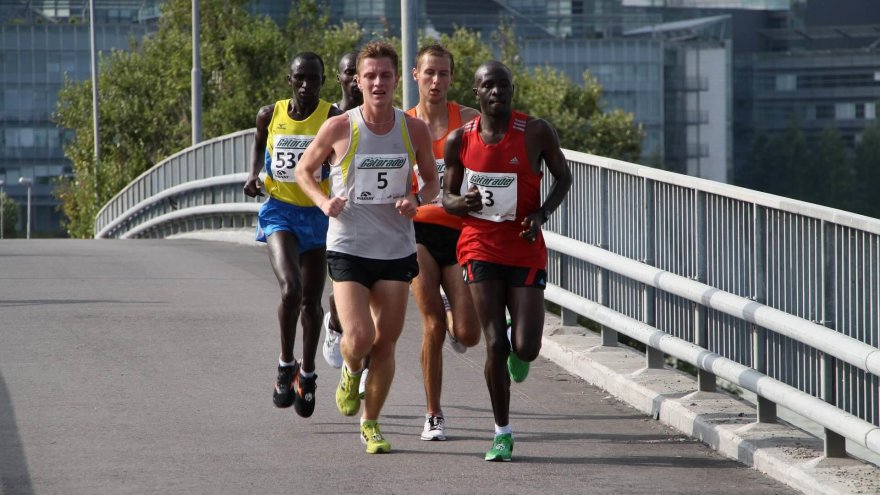3 Proven Cheats to Improve Race Performance

What if there was an easy way to give yourself an advantage in a race? Some sort of magical trick to literally manipulate that second (or third or fourth) wind from your deepest depths during a long, hard run? Something to just get you through that dark patch to a place where your feet feel lighter again and you know that you have what it takes to see it through to the finish line? Well, we are about to share some magic with you, but of course there is a catch. You have to be willing to cheat. You have to be willing to cheat your own mind.
Wire Your Mind Positively
It has been said many times over that running is 90% mental and 10% physical. This means that first you have to convince your mind that you can rise to the challenge, and the rest will follow. Wiring the mind positively isn’t as much a once-off cheat as it is a life skill that needs continuous practice to harness the full potential of its effects. But by making positivity a habit and a lifestyle, pushing through hard times during a run or a race by using positive affirmation will come more naturally.
Dr Gloria Petruzelli, clinical sport psychologist at California State University and multiple ironman finisher, teaches athletes to rewire their minds positively to make a long, challenging task more bearable. Petruzelli remarks that there are more than one TRUE way to view a situation, that the first thought or opinion of a situation isn’t necessarily the correct or most effective.

Science refers to positively rewiring the mind as cognitive reframing or restructuring. The first part of the two-part term refers to recognizing negative thought patterns. Teach yourself to notice early when negative thoughts arise in your mind. These thoughts could be along the lines of “I feel really tired, I doubt if I can keep this pace up to the end”. The second part of the term entails replacing the negative thoughts with positive, constructive self-talk. Positive replacement thoughts could be “Sure you are tired. You are supposed to get tired because you are running hard. You trained for it so it will be okay. Only try to keep the pace up for one more kay and see how you feel then”.
Make It Work
When negative thoughts arise during a run, learn to recognise it swiftly, acknowledge them and replace them with positive ones. The following methods may help with this:
- Visualisation: Visualise achieving your end goal and enjoying the rewards. Try to use all your senses to focus on how it will feel to cross that finish line, to receive that beautiful medal, to make that PR, to sit and rest or to have that piece of cake.
- Micro goals: How do you eat an elephant? One bite at a time! Break your run up into more manageable pieces, preferably a number that can be counted on one or both your hands so you can physically check that finger as you complete the section. Eight 5 kay’s (that last bit takes care of itself) is way easier to complete than 42.2 km! Only focus on the current section, and reward yourself after completing it.
Smile (and the World Smiles with You)
If we were to tell you that something as simple as flashing a smile, even if it is the last thing on your mind in during the hardest part of your race, could give you the edge, would it make you smile?
Have you ever noticed runners’ facial expression during a tough race? You can sometimes literally read a runner’s exertion and level of physical pain by the tortured frowning expression on his face. In 2010, a study by scientists from the Bangor University in Wales found that frowning accurately reflects the actual effort of the physical task.

On the flip-side, it seems all sorts of magical things happen when a person smiles. A lot if the magic is thanks to feel good neurotransmitters such as dopamine, endorphins and serotonin that are released during smiling. These neurotransmitters can have a relaxing effect on your body, lowering heart rate and blood pressure. Endorphins acts as a natural pain reliever, while serotonin is a naturally released mood-lifter. And even if you can’t find the energy to really smile, it seems faking it will also do the trick. According to this study, the physiological and psychological advantages of smiling can still be measured even if a smile isn’t genuine. So fake it if you have to!
In addition, another study showed that looking at a smiling person activates the reward centers of the brain. So you would actually feel rewarded when a person smiles at you. How do you get someone to smile at you? You smile at them! Smiling is contagious. When you smile at a person, the unconscious automatic response for that person would be to smile back.
Make It Work
When you know that smiling will give you a boost, it will be easy to find many things to smile about during a run. The mere ability to be out on a RUN should already make you smile!
- Think ahead and plant some smile-enticers for yourself before your race. Paint your nails some funky colors, wear that shirt with the funny slogan or that funky socks.
- Smile at fellow runners as they pass you or as you pass them
- Smile at and show gratitude for volunteers and supporters.
Divert The Mind
“You are always capable of doing more than you are doing. All maximum performances are actually pseudo-maximum performances” says Dr Bill Morgan, emeritus professor at the University of Wisconsin-Madison. The real limiting factor on performance is our minds. Once we start focusing on the burning sensation in our lungs, the heavy legs, the throbbing, swollen feet our minds start to tell us that it is time to stop. Even though we may be far from the actual limits of our abilities, once our minds are fixed on self-preservation of the body, the going seems to get even tougher. So in order to push beyond the limitations of our own minds to really tap into our potential we have to cheat our brains to push a little harder, go a little further.

A scientifically proven method to trick our minds to push through difficult patches is to take your mind off the task at hand. The only way to successfully achieve this is by diverting focus someplace else. This method of detachment from reality is called dissociation. Dr Morgan first proved the advantages of dissociation in his 1983 study of two groups of runners on treadmills. Researchers instructed one group to mentally repeat the simple mantra “down” every time a foot hit the mill. In addition, they had to sync their breathing with their steps while focusing on an external visual object. The control group just ran as normal. The dissociation group showed a statistically significant greater endurance than the control group.
Paula Radcliffe, the English runner holding the world marathon record for the past 15 years, confessed that she uses counting to take her mind off the distance she still has to go. She counts to 100 three times, as that would be the equivalent of one mile for her. Other athletes have reported focusing on their own shadow or the athlete’s in front of him to take his mind off the physical discomfort of a hard run.
Make It Work
Now that we know that ‘just don’t think about it’ is really only half a piece of advice, what else can we think about? If you are not a fan of listening to music on the run, try one of the following methods:
- Mantras: Repeat your favorite mantra while running. If needed, wear jewelry bearing your mantra or a cue to it, or write it on your arm.
- Gratitude: Think of all the things you can be grateful for to be able to run. Your health, your support crew, the volunteers, the financial means to compete.
- Be mindful: Really immerse yourself in the moment and focus on your surroundings. Notice the beauty of the environment, the cool breeze, the warmth of the sun. Take pictures if you can, greet fellow runners, wave to passersby.
In a Nutshell
No matter how well we prepare, sometimes some runs are harder than others. Just like in life, there are ups and downs, good parts and sucky parts. What goes up eventually will go down, but practice makes better (probably not perfect). The more tricks we have up our sleeve to cope with the hard parts and the more experience we have in applying them, the easier it will be to become that runner you are striving to be.
Sources
- , Cognitive Reframing: Mind “Trick” To Keep You Going When The Going Gets Tough, Online Publication
- , The face of effort: Frowning muscle activity reflects effort during a physical task. In: Biological Psychology (85)3: 377-382, Scientific Publication.
- , There is Magic in Your Smile. How Smiling Affects Your Brain., Online Publication
- , Grin and bear it: the influence of manipulated facial expression on the stress response. In: Psychological Science (23)11, Scientific Publication
- , I'm Not Really Running, I'm Not Really Running... In: The New York TImes, Online Publication
- , Facilitation of Physical Performance by Means of Cognitive Strategy. In: Cognitive Therapy and Research (7): 251-264., Scientific Publication
Latest Articles
 Is Running on a Treadmill Easier Than Running Outside?Runners have their own preferences, whether it is treadmill running, running outside on the road, or exploring trails. So...
Is Running on a Treadmill Easier Than Running Outside?Runners have their own preferences, whether it is treadmill running, running outside on the road, or exploring trails. So... Is It OK to Use Trail Running Shoes on the Road?While trail running shoes can be used on roads, especially in situations where a runner encounters mixed terrains or pref...
Is It OK to Use Trail Running Shoes on the Road?While trail running shoes can be used on roads, especially in situations where a runner encounters mixed terrains or pref... How to Fix Sore Quads After Running?Rest, ice, gentle stretching, and over-the-counter pain relievers can help soothe sore quads after running. Also, ensure ...
How to Fix Sore Quads After Running?Rest, ice, gentle stretching, and over-the-counter pain relievers can help soothe sore quads after running. Also, ensure ... 10 Fruits With The Most Electrolytes to Replace Sports DrinksThese fruits are high in electrolytes such as potassium, magnesium, and calcium, essential for hydration, muscle function...
10 Fruits With The Most Electrolytes to Replace Sports DrinksThese fruits are high in electrolytes such as potassium, magnesium, and calcium, essential for hydration, muscle function...

